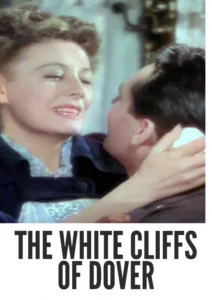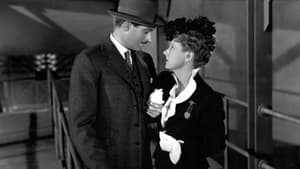Video Sources 0 Views

Synopsis

Immerse yourself in the sweeping romance and heartfelt drama of The White Cliffs of Dover, a classic film from 1944, now exquisitely colorized to bring its poignant story to life. Starring the luminous Irene Dunne, this film weaves a tale of love, loss, and enduring hope against the backdrop of two World Wars. Perfect for fans of classic Hollywood and those who appreciate stories of resilience and romance, this HD download offers a fresh perspective on a timeless cinematic treasure. Though sometimes known under the title The White Cliffs, this version ensures you experience every moment in rich, vibrant detail.
The White Cliffs of Dover chronicles the life of Susan Dunn (Irene Dunne), a young American woman who travels to England just before World War I and falls in love with Sir John Ashwood (Alan Marshal), a charming English nobleman. Their whirlwind romance leads to marriage, but their happiness is soon overshadowed by the outbreak of war. John enlists and tragically dies in combat, leaving Susan a widow and a single mother to their son, John Jr.As the years pass, Susan remains in England, raising her son and grappling with the loss of her beloved husband. When World War II erupts, John Jr. follows in his father’s footsteps and joins the fight, stirring up old fears and anxieties for Susan. The film explores themes of love, sacrifice, and the enduring bonds between nations during times of conflict. Through Susan’s eyes, we witness the human cost of war and the resilience of the human spirit. The White Cliffs of Dover is a moving tribute to the courage and determination of those who lived through these tumultuous times, offering a powerful message of hope and remembrance.
The film boasts a stellar cast of actors who bring depth and emotion to this compelling story:
- Irene Dunne as Susan Dunn
- Alan Marshal as Sir John Ashwood
- Roddy McDowall as John Ashwood Jr. (as a child)
- Peter Lawford as John Ashwood Jr. (as an adult)
- Frank Morgan as Hiram Porter Dunn
The White Cliffs of Dover is a wartime romance drama that blends elements of romance, historical drama, and melodrama. Its sweeping scope and emotional depth make it a quintessential example of classic Hollywood filmmaking.
Released in 1944, The White Cliffs of Dover was produced during the height of World War II and served as a powerful piece of propaganda aimed at strengthening the alliance between the United States and Great Britain. The film celebrates the shared values and sacrifices of both nations, promoting a message of unity and cooperation in the face of adversity. It also reflects the stylistic conventions of Hollywood’s Golden Age, with its lavish production design, sweeping musical score, and larger-than-life performances. While the film’s overt patriotism may seem dated to modern audiences, it offers valuable insights into the social and political climate of the time.
This colorized version of The White Cliffs of Dover has been meticulously restored to enhance the visual impact and emotional resonance of the film. The colorization process involved painstaking attention to detail, ensuring that the colors accurately reflect the historical setting and the characters’ emotional states. Advanced digital techniques were employed to bring out the nuances of the original black and white footage, resulting in a vibrant and immersive viewing experience. The specific tools and software used remain confidential, but the results speak for themselves. By adding color to this classic film, a new generation of viewers can appreciate its timeless story and powerful message. While debates persist regarding colorizing classic films, the goal is to broaden their appeal and ensure their preservation for future generations.
- : Clarence Brown
- : Claudine West, Jan Lustig, George Froeschel
- : The poem “The White Cliffs” by Alice Duer Miller
- : George Folsey
- : Robert Kern
- : Metro-Goldwyn-Mayer (MGM)
- : Loew’s, Inc.
- : 126 minutes
- : MP4
- : HD (1080p)
- : Compatible with most devices, including smartphones, tablets, computers, and smart TVs.
The White Cliffs of Dover (1944) was a box office success upon its release, praised for its emotional storytelling, strong performances, and patriotic message. While some critics found the film overly sentimental, it resonated with audiences who were deeply affected by the ongoing war. Today, the film remains a beloved classic, appreciated for its historical significance and its timeless exploration of love, loss, and remembrance. As a powerful example of wartime propaganda and classic Hollywood filmmaking, The White Cliffs of Dover continues to captivate and move viewers around the world.
- : What is The White Cliffs of Dover about?
- A: The White Cliffs of Dover is a wartime romance drama about an American woman who falls in love with an English nobleman during World War I.
- : Is The White Cliffs of Dover (1944) a propaganda film?
- A: Yes, The White Cliffs of Dover was produced during World War II as a piece of propaganda aimed at strengthening the alliance between the United States and Great Britain.
- : Is this version of The White Cliffs of Dover colorized?
- A: Yes, this version has been professionally colorized to enhance the viewing experience.
- : What makes The White Cliffs of Dover a classic film?
- A: The White Cliffs of Dover is a classic film due to its emotional storytelling, strong performances, and historical significance as a piece of wartime propaganda.
- : What is the download format?
- A: The download format is MP4, which is compatible with most devices.
- : What resolution is the download?
- A: The resolution is HD (1080p), providing a high-quality viewing experience.
Watch The White Cliffs of Dover Today!
















